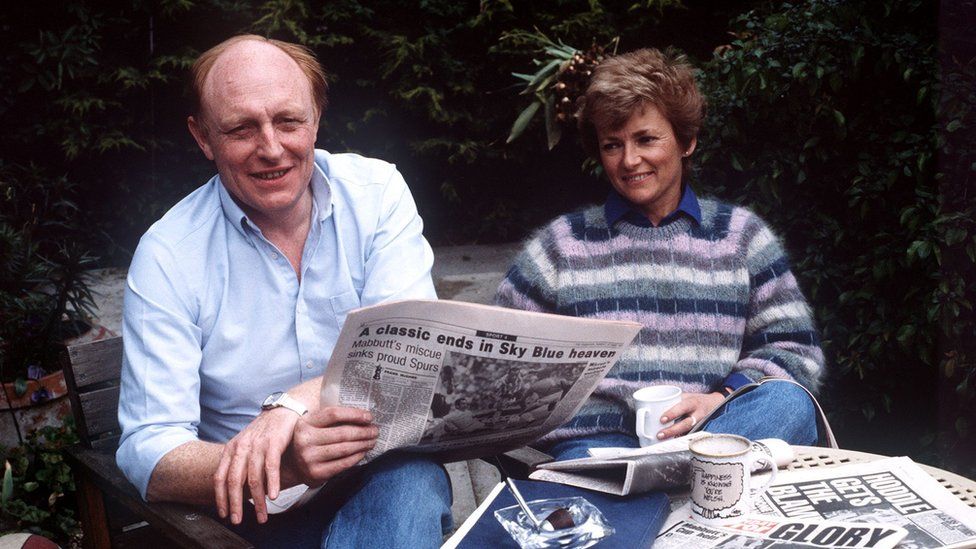Glenys Kinnock: Former minister and wife of Neil Kinnock dies aged 79
- Published

Former Labour minister Glenys Kinnock, an ex-MEP and wife of ex-Labour leader Lord Kinnock, has died at 79, her family have said.
They praised her political work, saying Europe, Africa and the UN were the "three great passions of her life".
Her family said she had "endured Alzheimer's" since a 2017 diagnosis and faced it with "innate courage".
Gordon Brown made her a baroness in 2009 so she could serve as a Foreign Office minister in his government.
Her family, which includes Labour MP Stephen Kinnock and daughter Rachel, said they were "devastated" by her death.
In a statement they said: "Neil was with her in her final moments. They had been married for 56 years.
"A proud democratic socialist, she campaigned, in Britain and internationally, for justice and against poverty all her life."
Stephen Kinnock, Labour MP for Aberavon, described her as "a beloved Mum and Nain who was adored by her family and friends".
In a social media post, he paid tribute to his mother as "a truly formidable person in every single way, and with such a cheeky sense of humour".
Labour leader Sir Keir Starmer called her a "true fighter" for the party.
He said: "She supported Neil through his leadership and went on to have an impressive political career of her own."
"Glenys was a passionate lifelong campaigner for social justice at home and abroad."
Former prime minister Sir Tony Blair said her death would be "mourned in many countries and corners of the Earth".
In a statement, he called her a "huge figure in progressive politics for decades: incredibly smart, brave, determined and resolute in standing up for what she believed was right."
He said: "Whether in fighting the cause of development, and the eradication of global poverty, social justice in Britain, equality for women or making the case for a European Union of weight and influence in the world, Glenys was passionate and persuasive.
"She was of course an enormous support to Neil but she was a leader in her own right."In her last years, as Stephen and Rachel have written, she took her illness with the same steadfastness which had governed her life."
The charity Dementia UK said that by publicly discussing their experiences of Alzheimer's, the Kinnock family had helped raise awareness and "the challenge that a diagnosis can bring".
'Painful' portrayal by media
Baroness Kinnock was born in Northamptonshire in 1944 and moved to Anglesey in north Wales.
She was 18 and studying at Cardiff University when she met Neil Kinnock. They married in 1967.
He spoke about the importance of supporting her in her illness, and said she had been "not just a rock, but a continent of rocks" during his career.
During her husband's Labour Party leadership from 1983 - and his two attempts to become prime minister - she was sometimes represented in the media as the power behind the throne, an experience she described as "painful" and "difficult to take".
"It was relentless, the description of me as being very manipulative and always undermining Neil," she said.
When he stepped down as Labour leader in 1992, she took up the political baton and served as an MEP, representing Wales at European level from 1994 to 2009.
During a Desert Island Discs interview after being elected, she spoke of her happiness at finding her own political voice.
"It has been a pleasure to be able to speak out about things that I care about," she said.
'Admired' minister
She received a life peerage in 2009 to enable her to join the Labour government, becoming Baroness Kinnock of Holyhead.
Gordon Brown said he was "delighted" when he "persuaded her" to join his government.
Paying tribute, Mr Brown said: "All who met Glenys admired her for her generosity, her warmth and her passionate support for the best of national and international causes."
She served as Minister for Europe and Minister of State with responsibility for Africa, the Caribbean, Central America and the UN.
Related Topics
- Published28 March 2022